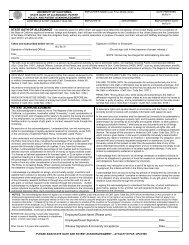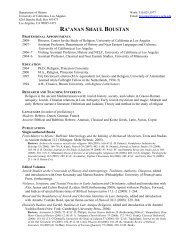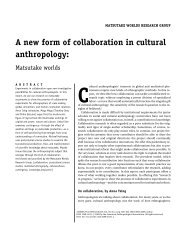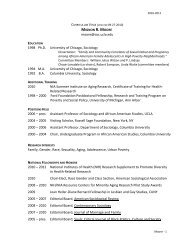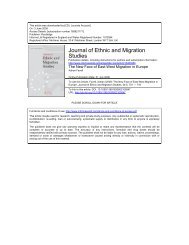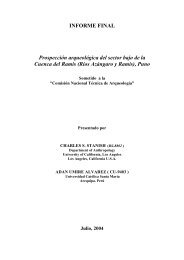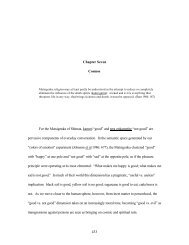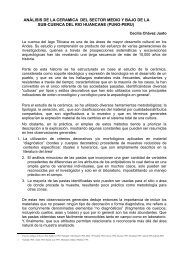The Long-Term Effects of Africa's Slave Trades - Social Sciences ...
The Long-Term Effects of Africa's Slave Trades - Social Sciences ...
The Long-Term Effects of Africa's Slave Trades - Social Sciences ...
You also want an ePaper? Increase the reach of your titles
YUMPU automatically turns print PDFs into web optimized ePapers that Google loves.
ethnicities <strong>of</strong> Africans. Hall (2005) finds that in American documents, the<br />
identification <strong>of</strong> ethnicities was made by the slaves themselves. Given the<br />
limited role played by European slave traders and slave owners in identifying<br />
the ethnicities <strong>of</strong> slaves, the accuracy <strong>of</strong> the documented ethnicities does<br />
not likely depend on the extent <strong>of</strong> the Europeans’ knowledge <strong>of</strong> African<br />
ethnicities. 13<br />
In all, data on the ethnic identity <strong>of</strong> slaves shipped during the trans-<br />
Atlantic slave trade come from 53 different samples, totalling 80,631 slaves,<br />
with 229 distinct ethnic designations reported. <strong>The</strong> ethnicity data for the<br />
Indian Ocean slave trade come from four samples, with a total <strong>of</strong> 12,885<br />
slaves and 33 reported ethnicities. <strong>The</strong> data for the Red Sea slave trade<br />
are from 2 samples: one from Jedda, Saudi Arabia and one from Bombay,<br />
India. <strong>The</strong> samples provide information for 67 slaves, with 32 ethnicities<br />
recorded. In the original documents the same ethnic designations are <strong>of</strong>ten<br />
referred to by different names or different spellings, depending on the<br />
language <strong>of</strong> the original documents or the year the documents are from. A<br />
great amount <strong>of</strong> research by African historians and ethnographers provides<br />
the information needed to map the ethnicities in the documents to modern<br />
political boundaries (e.g., Murdock, 1959; Curtin, 1969; Hall, 2005). Full<br />
details <strong>of</strong> the mapping <strong>of</strong> ethnicities to modern countries are documented in<br />
Nunn (2006a). Table 1 summarizes information about the samples used in<br />
the trans-Atlantic slave trades. Detailed information for the samples from<br />
the other slave trades is reported in Nunn (2006a).<br />
For the trans-Saharan slave trade two samples are available: one from<br />
Central Sudan and the other from Western Sudan. <strong>The</strong> samples provide information<br />
on the origins <strong>of</strong> 5,385 slaves, with 23 different ethnicities recorded.<br />
<strong>The</strong> main shortcoming <strong>of</strong> the ethnicity data is that they do not provide a<br />
sample for the whole region that slaves were taken from during this slave<br />
trade. However, the shipping data from Austen (1992), not only provide<br />
information on the volume <strong>of</strong> trade, but also information on which caravan<br />
slaves were shipped on, the city or town that the caravan originated in, the<br />
destination <strong>of</strong> the caravan, and in some cases, the ethnic identity <strong>of</strong> the<br />
slaves being shipped. Because there were only six trade routes that crossed<br />
the desert, the information on the volume, origins, and destinations <strong>of</strong> the<br />
13 Given that African ethnicities were self-identified, a second concern arises. If Africans<br />
<strong>of</strong> different ethnicities learned to communicate at different rates, then this may result in<br />
documented ethnicities that are not representative <strong>of</strong> the population. Although this is<br />
possible, data from slave runaway notices gathered by Gomez (1998, pp. 167–185) shows<br />
empirically that different ethnic groups did not demonstrate different abilities to learn<br />
European languages.<br />
13




